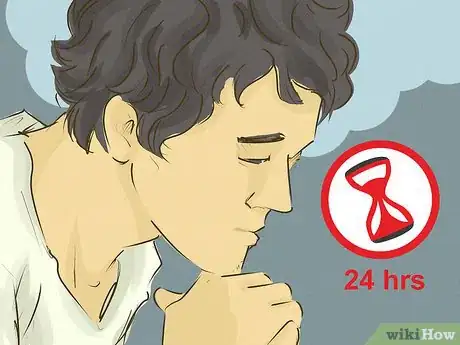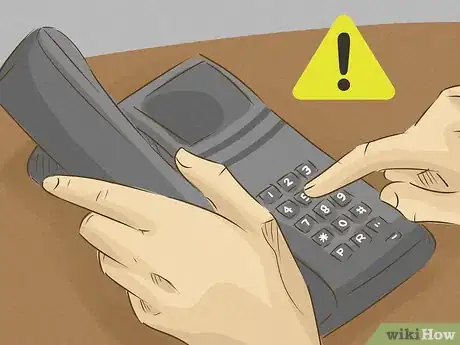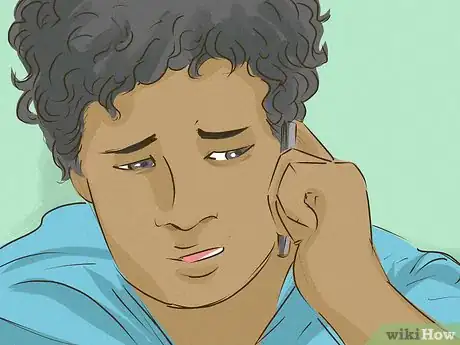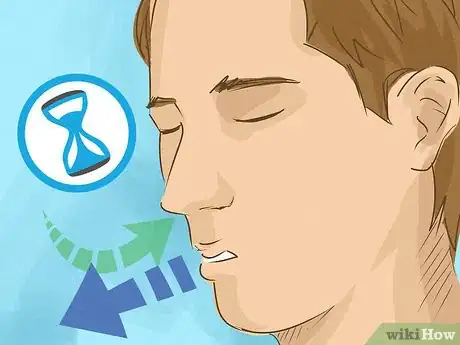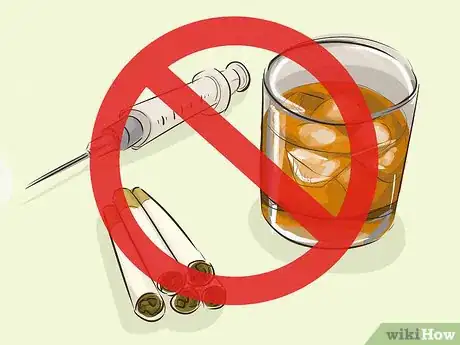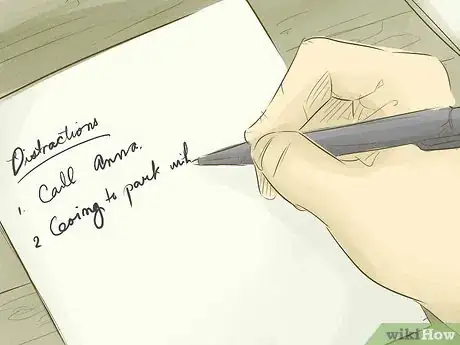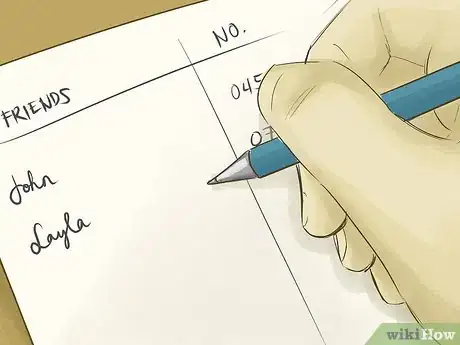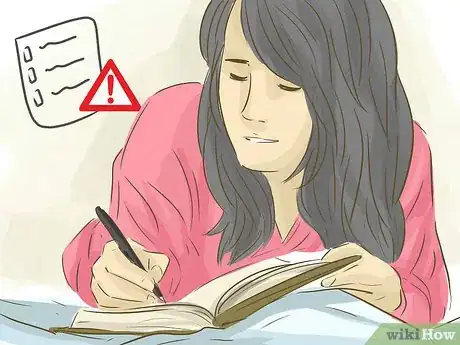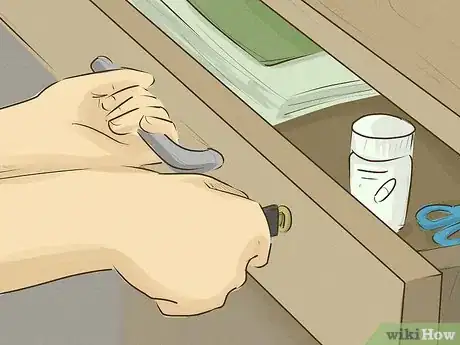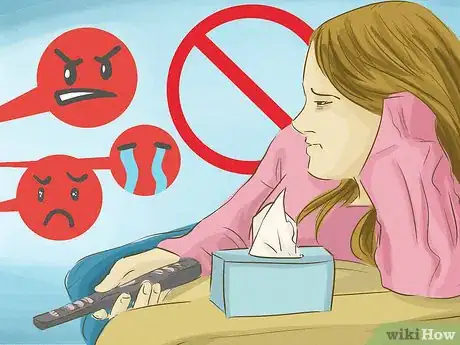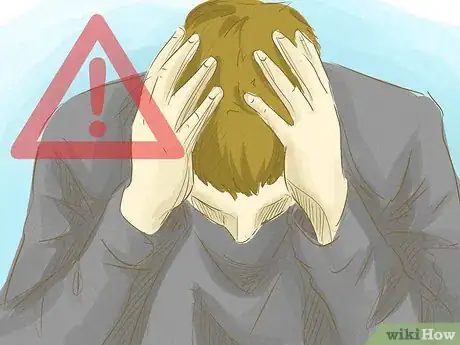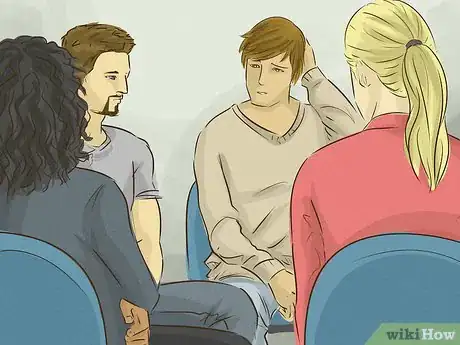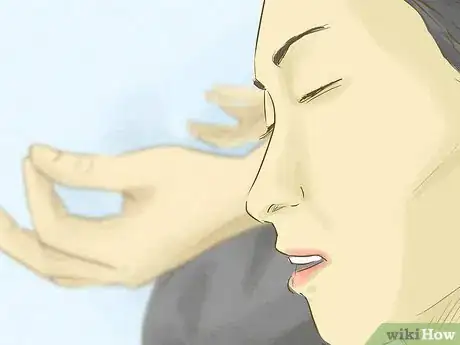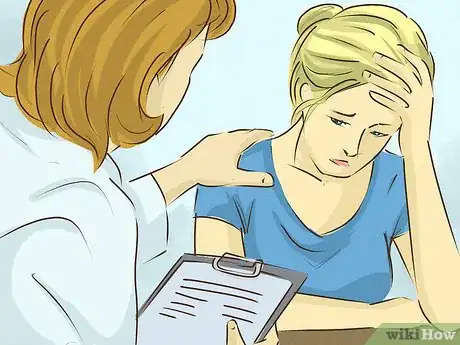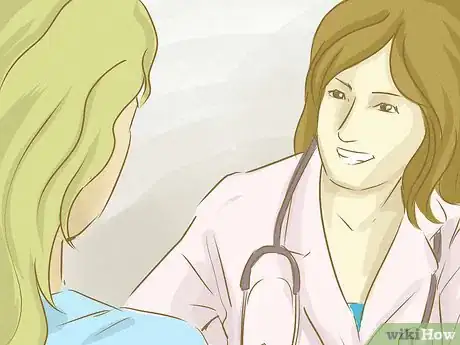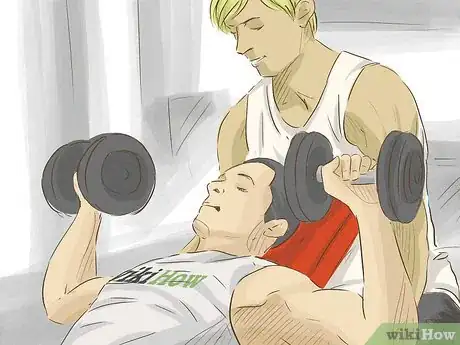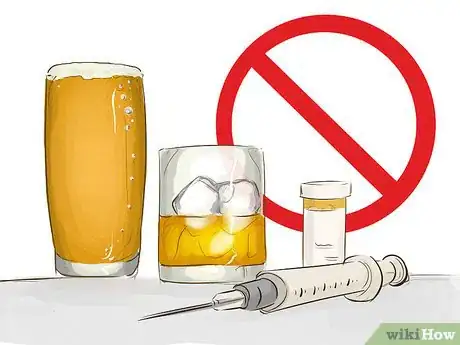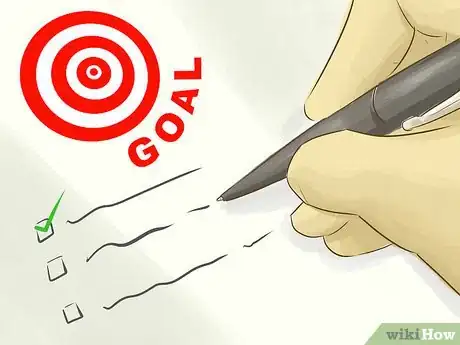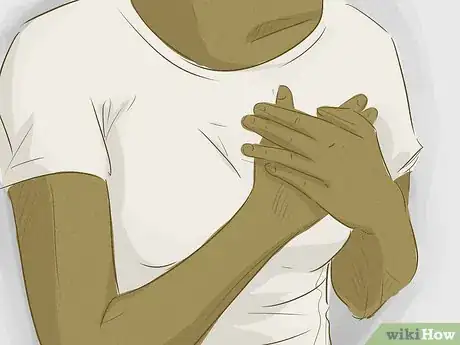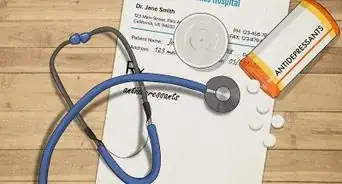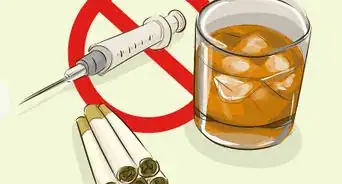This article was co-authored by Trudi Griffin, LPC, MS. Trudi Griffin is a Licensed Professional Counselor in Wisconsin specializing in Addictions and Mental Health. She provides therapy to people who struggle with addictions, mental health, and trauma in community health settings and private practice. She received her MS in Clinical Mental Health Counseling from Marquette University in 2011.
There are 29 references cited in this article, which can be found at the bottom of the page.
This article has been viewed 1,026,719 times.
Suicidal thoughts can happen when feelings of hopelessness, isolation, or despair become too heavy to bear. You might feel so overwhelmed with pain that suicide seems like the only way to release yourself from the burden you've been carrying. You should know that there is help available to deal with your feelings. Contacting a mental health professional can help you heal and experience joy and happiness again, no matter how impossible it seems right now. Consulting this article is a great first step. Read on to learn how to get help.
If you're having suicidal thoughts and need immediate help coping, please call emergency services such as 911, 999 or a suicide hotline:
- In the United States: call or text 988, the National Suicide and Crisis Lifeline.[1]
- In the United Kingdom: call 116 123, the Samaritans helpline[2] or 0800 068 41 41, the HOPELineUK
- The International Association for Suicide Prevention has a directory of international suicide prevention hotlines here, and so does Befrienders Worldwide here.
Steps
Staying Safe Right Now
-
1Put off any plans. Promise yourself that you'll wait 48 hours before doing anything. Remember, thoughts don’t have the power to force you to act.[3] Sometimes extreme pain can distort our perception. Waiting before taking action will give your mind time to clear.
-
2Seek professional help immediately. Suicidal thoughts can feel overwhelming, and there’s no reason to fight them alone. Ask a professional for help by calling emergency services or contacting a suicide hotline. These services have trained people ready to listen to you and offer help 24/7. Suicidal thoughts and impulses are very serious. Asking for help is a sign of strength.
- These services are free and anonymous.
- You can also call 911 (US), 999 (UK), or your emergency services number to be connected with a trained professional.
- If you are a university student, your university may have a suicide prevention line, often through campus police.
Advertisement -
3Go to the hospital. If you have called for help and are still experiencing suicidal thoughts, you need to go to the emergency room. Ask someone you trust to drive you, or call emergency services.[4]
- In the United States, it’s illegal for emergency rooms to turn you away in an emergency, even if you don’t have health insurance or can’t pay.[5]
- You can also look up mental health crisis centers or suicide prevention clinics in a directory. You may find low-cost options there.
-
4Call a trusted friend or loved one. Your risk of suicide is increased if you’re alone with suicidal thoughts. Don’t bottle them up or keep them to yourself. Call someone you love and trust and share your thoughts with them. Sometimes just talking to a good listener can help you cope and be enough to calm your thoughts. Stay on the phone, or ask the person to come over and be with you so you’re not on your own.[6] [7]
- You may feel worried or embarrassed about talking to someone about your feelings. The people who love you will not judge you for sharing these feelings with them. They will be glad that you called rather than try to handle everything on your own.
- You can't predict when new options might appear. It's impossible to know what might happen if you just wait 2 more days. If you act on your thoughts now you'll never find out what could have been.
-
5Wait for help. If you’ve called emergency services or a friend to come over, focus on keeping yourself safe while you’re on your own. Take deep, calming breaths and repeat some coping statements to yourself. You could even write these statements down to reinforce them in your mind.
- Examples of coping statements could include: “My depression is talking, not me,” “I will get through this,” “I’m just having thoughts right now - they can’t make me do anything,” “There are other ways to handle my feelings.”[8]
-
6Stop using drugs and alcohol. You might be trying to make the thoughts go away by drinking or using drugs. But adding these chemicals to your body actually just makes it a lot harder to think clearly, which you need to be able to do to cope with suicidal thoughts. If you're drinking or doing any drugs right now, stop and give your mind a break. Many people may use alcohol and other narcotics as antidepressants, but the relief that they provide is merely transitory. [9]
- If you don't feel like you can stop, be with someone else - don't stay by yourself. Avoid being alone. Solitude does not help suicidal thoughts, in fact, it can worsen them to a great extent.
Developing a Safety Plan
-
1Make a list of things you love. This is a list of everything that has helped you cope in the past. Write down the names of your best friends and the family members you love, your favorite places, music, movies, books that have saved you. Include little things like your favorite foods and sports, bigger things like hobbies and passions that help you wake up in the morning.[10]
- Write down what you love about yourself - your personality traits, physical traits, accomplishments, and things that make you proud.
- Write down things you plan to do later in life - the places you want to travel, the children you want to have, the people you want to love, experiences you've always wanted.
- It may be helpful to have a friend or loved one help you with this list. Depression, anxiety, and other common causes of suicidal thoughts can get in the way of allowing you to see what is wonderful and special about you.
-
2Make a list of good distractions. This isn't a list of "healthy habits" or "self-improvement techniques" - it's a list of anything you can do to distance yourself from committing suicide when the thoughts start to get too heavy to bear. Think about what has worked in the past, and write it down. Here are a few examples:
- Eating at your favorite restaurant
- Calling an old friend to talk
- Watching your favorite TV shows and movies
- Rereading a favorite book that brings you comfort
- Going on a road-trip
- Looking at old emails that make you feel good
- Hanging out with your dog in the park
- Going for a long walk or run to clear your head
-
3Make a list of people in your support system. Write down at least five names and phone numbers of people who are reliable and will be able to talk with you when you call. Include plenty of people in case someone isn't available when you call.
- Write down the names and phone numbers of your therapist and support group members.
- Write down the names and numbers of crisis hotlines you might want to call.
-
4Write a safety plan. A safety plan is a written plan for when you experience suicidal thoughts. In the moment, you may not remember what actions to take to help yourself feel better. Having a plan written down can help you get past the initial feelings and stay safe. Here's an example of a safety plan:
- Read my list of Things I Love. Remind myself of the things I love that have helped prevent me from committing suicide before.
- Try an item from my list of Good Distractions. See if I can distract myself from suicidal thoughts with something that has worked in the past.
- Call someone on my list of People in My Support System. Keep calling people until I get in touch with someone who can talk for as long as I need to.
- Delay my plan and make my home safe. Lock away anything I could use to harm myself, then think things over for at least 48 hours.
- Ask someone to come stay with me. Have them stay until I feel OK by myself.
- Go to the hospital.
- Call the emergency services.
- Give a copy of your plan to a trusted friend or loved one.
- Whenever you experience suicidal thoughts, consult your safety plan.
Keeping Yourself Safe
-
1Make your home safer. If you’re experiencing suicidal thoughts or are worried that you will, take opportunities to harm yourself away.[11] Suicide is most likely to happen when you have a way to harm yourself.[12] Get rid of anything that you could use to harm yourself, like pills, razors, sharp objects, or guns. Give them to someone else for safekeeping, toss them out or lock them away. Don't make it easy for yourself to change your mind.
- If you don't feel safe staying by yourself at home, go to a place where you do feel safe, like a friend's house, your parents’ house, or a community center or other public place.
- If you are thinking of taking an overdose of prescription medication, give your medicines to a trusted loved one who can give them back to you in daily doses.[13]
-
2Seek professional help. A mental health professional can help you deal with what’s causing your suicidal thoughts.[14] Suicidal thoughts are often the result of other mental health conditions, such as depression and bipolar disorder, that are treatable.[15] Stressful or traumatic events may also prompt suicidal thoughts. Whatever is behind your thoughts and feelings, a counselor or therapist can help you learn to deal with it and become healthier and happier.[16]
- Treatment for depression is successful in 80-90% of cases.
- Common and effective treatments for people considering suicide include:[17]
- Cognitive-behavioral therapy (CBT) helps you change unhelpful and “automatic” ways of thinking
- Problem-solving therapy (PST) can help you learn how to feel more confident and in control by learning to solve problems
- Dialectical behavioral therapy (DBT) teaches coping skills and is very helpful for people with borderline personality disorder
- Interpersonal therapy (IPT) helps you improve your social functioning so that you don’t feel isolated or unsupported
- Your healthcare professional may recommend a combination of medication and therapy. Be sure to take all medications as prescribed.
- Be aware that some medications may increase suicidal thoughts. If you experience any suicidal thoughts after taking your prescriptions, contact your doctor.
-
3Stay away from triggers. Sometimes certain places, people or habits can trigger thoughts of despair and suicide. It might be hard to make the connection at first, but start thinking about whether there are patterns that might clue you into potential triggers. Whenever possible, avoid things, people and situations that make you feel sad, hopeless, or stressed.[18] Here are a few examples of triggers:
- Drinking alcohol and doing drugs. It feels good at first, but it can turn negative thoughts into suicidal ones very quickly. Alcohol is involved in at least 30% of suicides.
- People who are physically or emotionally abusive.
- Books, movies and music with dark, emotional themes.
- Stressful situations.
- Being alone.[19]
-
4Learn to recognize your warning signs. Suicidal thoughts don’t simply happen on their own. They’re the result of something, such as feeling hopeless, depressed, grieving, or stressed. Learning to recognize what other thoughts and behavior tend to appear when you struggle with suicidal thoughts can help alert you to when you need to seek extra support from others. Common warning signs include:[20]
- Increase in use of alcohol, drugs, or other substances
- Feeling hopeless or purposeless
- Feeling angry
- Increased recklessness
- Feeling trapped
- Isolating yourself from others
- Feeling anxious
- Sudden changes in your mood
- Losing interest in things you used to enjoy
- Change in sleeping habits and/or appetite
- Feelings of guilt or shame
Strengthening Your Support System
-
1Connect with others. Building a strong support network is one of the most important things you can do to help you cope with your thoughts. Feeling isolated, unsupported, or as though others would be better off without you are common feelings behind suicidal thoughts. Reach out to others and talk with someone every day. Connecting with people who care about you can help you improve your coping skills and protect you against your thoughts when they show up.[21] [22]
- Talk with a spiritual figure. If you’re a spiritual or religious person, you may find comfort in talking with a spiritual figure, such as a rabbi or priest.
- Chat with a friend. Make a habit of reaching out to at least one person a day, even on the days where you don’t want to. Isolating yourself from others can contribute to increased suicidal thoughts.
- Call a hotline. Don’t feel like you can only call a suicide prevention hotline once. Even if you need to call every day or several times a day for a while, do it. They’re there to help you.
- Find a community of people like you. People in groups who are often oppressed, such as LGBT people have a higher risk of suicide. Finding a community where you can be yourself without facing hate or oppression can help you stay strong and love yourself.[23]
- If you’re a young person who’s lesbian, gay, bisexual, trans, or queer and are considering suicide, call the Trevor Lifeline in the US at 1-866-488-7386 or instant message them from their website.[24]
-
2Find a support group. No matter why you're having suicidal thoughts, you don't have to go through this by yourself. Many, many other people have experienced what you're going through. Many people have wanted to die one day, and been glad the next day to still be alive. Talking with people who get what you're going through is one of the very best ways to cope with suicidal thoughts.[25] [26] You can find a support group near you by calling a suicide prevention hotline or asking your mental health professional.[27]
- Call or text the National Suicide and Crisis Lifeline at 988.
- If you're gay, lesbian, bisexual, or trans, call 1-888-THE-GLNH (1-888-843-4564)
- If you’re a veteran, call 800-273-TALK and press 1
- If you're a teenager, call Covenant House NineLine at 1-800-999-9999
- You can also find support groups in the US by visiting the American Foundation for Suicide Prevention’s website.[28]
-
3Work on loving yourself. Focus on altering your negative thought patterns and realizing the negative thoughts are not true. In order to start relieving the pain of your negative feelings, you need to be kind to yourself and see yourself as a strong person who is persevering.[29]
- Myths about suicide, such as the idea that it's a selfish act, are perpetuated by many cultures, causing people who have suicidal thoughts to feel guilty or ashamed on top of the negative feelings they're already burdened with.[30] Learning how to separate these myths from reality can help you cope better with your thoughts.
- Find some positive mantras that you can recite when you feel down. Affirming that you’re a strong person who is worthy of love can help you remember that these suicidal thoughts are only temporary. For example, “I am feeling suicidal at this moment. Feelings are not facts. They will not last forever. I love myself and will honor myself by staying strong” or “I can learn how to cope with these thoughts. I am stronger than they are.”
-
4Work on the issues behind your thoughts. Working with a mental health professional can help you uncover some of the reasons behind your suicidal thoughts. These thoughts can be caused by many things, from medical problems to legal trouble to substance abuse. Find ways to address these issues, and you will probably find that you feel better over time.[31]
- For example, if you feel hopeless over your finances, seek out a financial planner or counselor. Many communities and universities run low-cost clinics to help people learn how to manage money.
- If you feel hopeless over your personal relationships, ask your therapist about social skills training. This type of training can help you overcome social anxiety and awkwardness to form and maintain meaningful relationships with others.
- Try taking a class in mindfulness meditation, or learn on your own. Studies have shown that mindfulness, which focuses on accepting what is happening in the present moment without avoiding or judging it, can be helpful in managing suicidal thoughts.[32]
- Bullying is a common cause of suicidal thoughts in young people. Remember not to blame yourself: someone else’s treatment of you is their responsibility, not yours. Counseling can help you cope with bullying and preserve your sense of self.
Taking Care of Yourself
-
1Ask a doctor about chronic pain. Sometimes, chronic pain can cause suicidal thoughts and emotional distress. Talk with your doctor about what you can do to address your pain. It may help you feel healthier and happier.
-
2Get enough exercise. Exercise has been shown to help reduce the effects of depression and anxiety.[33] It can be difficult to exercise if you’re feeling depressed, but setting a schedule for yourself working out with a friend can help you.[34]
- Going to exercise classes can also be a good way to connect with others so you don’t feel isolated or alone.
-
3Get good sleep. Depression often changes your sleep habits, making you sleep too much or too little. Research has shown a link between disturbed sleep habits and suicidal thoughts.[35] Making sure to get good, undisturbed sleep can help you keep a clear head.
- Talk with your doctor if you can’t sleep.
-
4Avoid drugs and alcohol. Drugs and alcohol are involved in many suicides because they cloud your judgment.[36] They can also increase depression and cause reckless or impulsive behavior. If you’re having suicidal thoughts, avoid drugs and alcohol completely.[37]
- If you are struggling with alcohol, find a local chapter of Alcoholics Anonymous. This organization can help you overcome your problems with alcohol, which may help with your suicidal thoughts.[38]
-
5Develop a hobby. A hobby, like gardening, painting, playing a musical instrument, learning a new language etc. can distract your mind from repeated, unwanted thoughts and make you feel a little comfortable. If you already have an old hobby, which has recently been neglected because of your low mood or otherwise, go back to it. If you don't, develop a new one. It may require some deliberate effort initially, but sooner than later, you will feel automatically attracted to it.
-
6Focus on the positives of the past. Everyone has some achievements at some point of her life, which may be overshadowed by the current depressive state. Recount those. Think of the positive moments of the past, your effective struggles, your moments of triumph, joy, and glory.
-
7Set some personal goals. You probably have some goals you want to achieve. Perhaps you’ve always wanted to see the Sydney Opera House or spelunk in New Mexico. Perhaps you just want to adopt ten cats and create a furry little family. Whatever your goals, write them down. Remember them when times get bad.[39]
-
8Believe in yourself. It can be hard to imagine that things can get better when you are experiencing suicidal thoughts. Remember that others have come through this, and you will too. You can care for yourself, take control of your life, and get treatment. You’re strong.
- Remind yourself that feelings aren’t facts. When you experience these thoughts, take a moment to challenge them by saying something like “I am feeling right now like people would be better off without me, but the reality is that I just talked to a friend today who said she was happy I was in her life. My thoughts are not fact. I can get through this.”[40]
- Give it time. You may think that suicide will make your problems just “go away.” Unfortunately, you’ll never get the chance to see whether things get better if you take that road. Healing from trauma, overcoming grief, and fighting depression all take time. Be patient and kind to yourself.[41]
Expert Q&A
-
QuestionWhat if people think I'm overreacting and should get over it?
 Karissa Brennan, LMHC, MAKarissa Brennan is a licensed Mental Health Counselor, Distance Credentialed Counselor, and Psychotherapist based in New York City with over 9 years of experience. She received her MA in Mental Health Counseling from the City College of New York in 2011. She is a member of the International Society for Mental Health Online.
Karissa Brennan, LMHC, MAKarissa Brennan is a licensed Mental Health Counselor, Distance Credentialed Counselor, and Psychotherapist based in New York City with over 9 years of experience. She received her MA in Mental Health Counseling from the City College of New York in 2011. She is a member of the International Society for Mental Health Online.
Mental Health Counselor If people think you're overreacting and should get over something, they might be incapable of having a serious discussion with you for one reason or another. Perhaps they're busy, or the topic is too "real" for them. If your family and friends have not been understanding or helpful, then try to find someone who will take you seriously and who will be able to help you. For example, you could try talking to your doctor, therapist, teacher, school counselor, or human resources manager.
If people think you're overreacting and should get over something, they might be incapable of having a serious discussion with you for one reason or another. Perhaps they're busy, or the topic is too "real" for them. If your family and friends have not been understanding or helpful, then try to find someone who will take you seriously and who will be able to help you. For example, you could try talking to your doctor, therapist, teacher, school counselor, or human resources manager. -
QuestionI feel like suicide will end my pain. Will it not?
 Karissa Brennan, LMHC, MAKarissa Brennan is a licensed Mental Health Counselor, Distance Credentialed Counselor, and Psychotherapist based in New York City with over 9 years of experience. She received her MA in Mental Health Counseling from the City College of New York in 2011. She is a member of the International Society for Mental Health Online.
Karissa Brennan, LMHC, MAKarissa Brennan is a licensed Mental Health Counselor, Distance Credentialed Counselor, and Psychotherapist based in New York City with over 9 years of experience. She received her MA in Mental Health Counseling from the City College of New York in 2011. She is a member of the International Society for Mental Health Online.
Mental Health Counselor Suicide will end your life. Antidepressants and/or psychotherapy can ease psychological pain temporarily to create a comfortable space and you can seek therapy to work towards recovery and learn tools for dealing with your emotions. There are many ways to get through pain, and identifying where the pain is coming from is a good start.
Suicide will end your life. Antidepressants and/or psychotherapy can ease psychological pain temporarily to create a comfortable space and you can seek therapy to work towards recovery and learn tools for dealing with your emotions. There are many ways to get through pain, and identifying where the pain is coming from is a good start. -
QuestionIs thinking of giving up on it all depression?
 Shari Forschen, NP, MAShari Forschen is a Registered Nurse at Sanford Health in North Dakota. Shari has worked in healthcare since 1996 and her expertise lies in acute care bedside nursing on a medical oncology floor. She received her degree from Medcenter one College of Nursing in 2003 and her Family Nurse Practitioner Masters from the University of North Dakota in 2014. Shari is a member of the American Nurses Association.
Shari Forschen, NP, MAShari Forschen is a Registered Nurse at Sanford Health in North Dakota. Shari has worked in healthcare since 1996 and her expertise lies in acute care bedside nursing on a medical oncology floor. She received her degree from Medcenter one College of Nursing in 2003 and her Family Nurse Practitioner Masters from the University of North Dakota in 2014. Shari is a member of the American Nurses Association.
Master's Degree, Nursing, University of North Dakota This is a medical emergency. If by meaning "giving up on it all" equates to suicide, you should call 911 and/or go to emergency department.
This is a medical emergency. If by meaning "giving up on it all" equates to suicide, you should call 911 and/or go to emergency department.
Additional Resources
| Organization | Phone Number |
|---|---|
| National Suicide and Crisis Lifeline |
988 |
| Suicide.org |
(800) 784-2433 |
| IMAlive |
(800) 442-4673 |
| Samaritans (UK) |
116 123 |
| Boys Town |
(800) 448-3000 |
| The Trevor Project (LGBTQ) |
(866) 488-7386 |
Warnings
- Never do drugs to make yourself feel better. Drugs only make the situation worse by impairing your ability to think reasonably, increasing your suicide risk.⧼thumbs_response⧽
- Never cut yourself. It is dangerous and it leaves behind scars that you will regret later.⧼thumbs_response⧽
- If you are suicidal, call someone! It is an emergency and you should treat it as such. Call 1-800-SUICIDE or look up another suicide hotline, even the emergency services. They will help you calm down and give you the assistance you need. You can make that one call and it could be the most important call of your life.⧼thumbs_response⧽
- Remember that if you kill yourself, you kill the memories, the love and all the good things along with your troubles. Focus on the good side until you feel better. Remember, life is precious and if you're dealing with the loss of a loved one, know it isn't your fault.⧼thumbs_response⧽
References
- ↑ http://www.suicidepreventionlifeline.org/
- ↑ http://www.samaritans.org/how-we-can-help-you/contact-us
- ↑ http://www.mayoclinic.org/diseases-conditions/suicide/in-depth/suicide/art-20048230
- ↑ http://www.medicinenet.com/suicide/page7.htm
- ↑ http://web.archive.org/web/20090116041157/http://www.acep.org/patients.aspx?id=25932
- ↑ http://www.healthquality.va.gov/guidelines/MH/srb/OvercomingSuicidalThoughtsandFeelingsFINAL.pdf
- ↑ http://www.helpguide.org/articles/suicide-prevention/suicide-help-dealing-with-your-suicidal-thoughts-and-feelings.htm
- ↑ http://www.speakingofsuicide.com/2014/05/14/coping-statements/
- ↑ http://www.get.gg/suicidal.htm
- ↑ https://www.psychologytoday.com/blog/hide-and-seek/201204/fighting-suicidal-thoughts
- ↑ http://www.helpguide.org/articles/suicide-prevention/suicide-help-dealing-with-your-suicidal-thoughts-and-feelings.htm
- ↑ https://www.psychologytoday.com/blog/hide-and-seek/201204/fighting-suicidal-thoughts
- ↑ http://www.helpguide.org/articles/suicide-prevention/suicide-help-dealing-with-your-suicidal-thoughts-and-feelings.htm
- ↑ http://www.mayoclinic.org/diseases-conditions/suicide/basics/treatment/con-20033954
- ↑ http://www.helpguide.org/articles/suicide-prevention/suicide-help-dealing-with-your-suicidal-thoughts-and-feelings.htm
- ↑ http://www.healthquality.va.gov/guidelines/MH/srb/OvercomingSuicidalThoughtsandFeelingsFINAL.pdf
- ↑ http://www.healthquality.va.gov/guidelines/MH/srb/OvercomingSuicidalThoughtsandFeelingsFINAL.pdf
- ↑ https://www.mentalhelp.net/articles/suicide-triggers/
- ↑ http://familydoctor.org/familydoctor/en/diseases-conditions/depression/symptoms/coping-with-suicidal-thoughts.html
- ↑ http://www.healthquality.va.gov/guidelines/MH/srb/OvercomingSuicidalThoughtsandFeelingsFINAL.pdf
- ↑ http://www.helpguide.org/articles/suicide-prevention/suicide-help-dealing-with-your-suicidal-thoughts-and-feelings.htm
- ↑ http://www.healthquality.va.gov/guidelines/MH/srb/OvercomingSuicidalThoughtsandFeelingsFINAL.pdf
- ↑ http://www.thetrevorproject.org/pages/facts-about-suicide
- ↑ http://www.thetrevorproject.org/pages/facts-about-suicide
- ↑ http://www.medicalnewstoday.com/articles/193026.php
- ↑ http://www.helpguide.org/articles/suicide-prevention/suicide-help-dealing-with-your-suicidal-thoughts-and-feelings.htm
- ↑ http://www.helpguide.org/articles/suicide-prevention/suicide-help-dealing-with-your-suicidal-thoughts-and-feelings.htm
- ↑ https://afsp.org/get-help
- ↑ https://www.psychologytoday.com/blog/hide-and-seek/201204/fighting-suicidal-thoughts
- ↑ http://www.npr.org/templates/story/story.php?storyId=126365907
- ↑ http://www.healthquality.va.gov/guidelines/MH/srb/OvercomingSuicidalThoughtsandFeelingsFINAL.pdf
- ↑ http://www.ncbi.nlm.nih.gov/pmc/articles/PMC3383812/
- ↑ http://www.mayoclinic.org/diseases-conditions/depression/in-depth/depression-and-exercise/art-20046495
- ↑ http://www.helpguide.org/articles/suicide-prevention/suicide-help-dealing-with-your-suicidal-thoughts-and-feelings.htm
- ↑ http://www.ncbi.nlm.nih.gov/pmc/articles/PMC2656315/
- ↑ http://www.mentalhealthamerica.net/suicide
- ↑ http://www.nber.org/digest/aug02/w8810.html
- ↑ http://www.aa.org/
- ↑ http://www.helpguide.org/articles/suicide-prevention/suicide-help-dealing-with-your-suicidal-thoughts-and-feelings.htm
- ↑ http://www.dcoe.mil/content/Navigation/Documents/SPC2012/2012SPC-Blauner-Operation_Decisive_Victory.pdf
- ↑ http://www.nytimes.com/2008/07/06/magazine/06suicide-t.html?
About This Article
To cope with suicidal thoughts, try doing anything you can to distract yourself, like calling a friend to talk, watching your favorite movie, or playing with your dog. If you're not up for that, try making a list of all the things you love, like your friends, family, pets, and hobbies. Remember that you don't have to fight your suicidal thoughts alone. If you're feeling overwhelmed, call emergency services or a suicide hotline, like 1-800-273-TALK, to talk to someone and get help. To learn how to overcome suicidal thoughts and start feeling happy again, keep reading.
